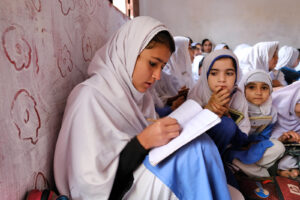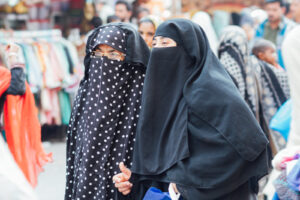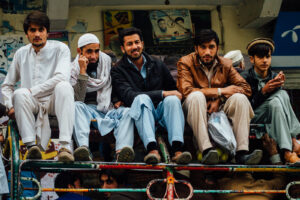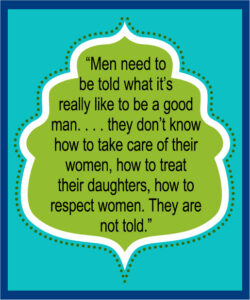Marlowsphere (Blog #155)
In Part I of this blog (posted last week), Female Student (FS) informed us of the inequities she and other females experience vs. males in the Pakistani culture.
Memorization vs. Analysis or Questioning
EM: What about formal education in Pakistan?
FS: I completed high school in Pakpattan. In that region of Pakistan people are very narrow-minded. Very, very narrow-minded.
The teachers have the same mindset as the people living there. So, they are transferring that mindset to the students. The type of study is  different here from there. It was more like reading through the pages and just memorizing them. There is no creativity and no effort to allow students to acknowledge what skills they have. Students are not allowed or given the opportunity to choose their own field. They are not given choice from the start. That really messes things up when you’re not given a choice in your life ever.
different here from there. It was more like reading through the pages and just memorizing them. There is no creativity and no effort to allow students to acknowledge what skills they have. Students are not allowed or given the opportunity to choose their own field. They are not given choice from the start. That really messes things up when you’re not given a choice in your life ever.
EM: How come you’re so open-minded?
FS: That’s an interesting question. I became more open-minded when I came here. I had the same mindset before I came here. I was talking about this yesterday to my friend. She said “You don’t judge people.” That’s why we have such a good bonding.
I told her I wasn’t always like this. If you met me four years back, I was so judgmental, so narrow-minded that I judged every person I saw. If I look back at myself four years ago, I see myself as a horrible person with the same mindset of the people I criticize now. When I came to America everything started to change. The way I started to look at the world changed.
It really changed for me when my mother was really very sick. She had ulcerated colitis. She was extremely ill. She was on her death bed. I had to take care of her. I struggled a lot in that phase. I had college and housework and I had to take care of my mother. At that time, it kind of changed me because I started to realize about the education I was getting here. I was never allowed, or you could say, that I never really had the chance to acknowledge the talents or skills I have, or what I can really do and really want to do in life in Pakistan.
My parents always told me “We want you to be a doctor.” I was like, “Yeah, I want to be a doctor.” But it all changed when I came here and I really got to know that I don’t really want to be in that field. It would be suffocating if I choose this. I was trying to find myself, where I really stand and who I really am as a young woman. Things started to change for me here.
 EM: You started your college career at Queens Community College. Was there any particular course or professor you were taking that helped you change your attitude or perspective or was it just the overall environment?
EM: You started your college career at Queens Community College. Was there any particular course or professor you were taking that helped you change your attitude or perspective or was it just the overall environment?
FS: It was the overall environment, especially two of my professors from my literature class. My one English professor, during her lecture, always used to add some lines out of nowhere that were inspiring and really eye-opening. I found myself catching every sentence she threw at us. I really like the spirit she had. Every time she was teaching something, out of nowhere she just said a sentence about woman empowerment. That was really different for me because I had never been told those things. I came from an area in Pakistan where if a girl is caught with a boy—looking, smiling, holding hands, embracing—she could be killed, as in an honor killing.
My Mother’s Unfulfilled Life
FS: The other thing that was really eye-opening for me was my mother. She’s been through a lot. She was the most creative, most intelligent and the most beautiful person I have known. She had talent to be a writer, a poet, a painter. She wanted to be a doctor but nobody allowed  her to be. Then she got married. Nobody allowed her to write or to paint. She was just told “You are here to serve your in-laws and look after your kids.”
her to be. Then she got married. Nobody allowed her to write or to paint. She was just told “You are here to serve your in-laws and look after your kids.”
Whenever I saw the inner turmoil she was going through, it just clicked one day that I don’t want to have her life. I don’t want to be oppressed like she has been all her life. I don’t want to be in a relationship similar to my mother’s. I don’t want my children to see the same thing that I am seeing every day. In some ways, I always, always got inspiration from my mother. She is an ideal for me because you can say that her mindset is different from the people from our culture. When I was younger, she always told me “I don’t like how you think.”
EM: She said that to you?
FS: Yes. Often, my mother told me when I was younger, when I wasn’t like how I am right now, she would scold me about not doing the right thing for myself. At that time, I didn’t understand because I was with people who thought it was the right thing to think like everybody else in a narrow-minded way. Even while living among those people in Pakistan for a lot of years, she didn’t change her mindset. Even after a lot of opportunities were snatched away from her, a lot of jobs that she wanted to do, she didn’t change herself to go after them. I think the biggest eye-opener for me is my mother’s plight changed me as a person while I was looking after her and taking care of her when she was sick. I realized I am inspired by her, but I don’t want to be in the situation she is in right now.
EM: She survived COVID?
FS: Yes, she is so much better and she is recovering. Even from after COVID, her situation changed, she got much better. She was on steroids before COVID but she had to quit them because when you have COVID and are taking steroids the situation gets worse so she had to quit them. Steroids are the type of drug that when quit them without any tapering your body goes through a withdrawal and causes a bad reaction. Her condition really worsened after that. When she recovered from the after-effects of quitting steroids, then she started to get better. Her treatment is continuing so she’s much better than three years back or so.
EM: Does your mother work or is she a housewife who takes care of the kids and your father?
FS: She’s a housewife.
Navigating the Future
 EM: What are you going to do when you graduate? Are you going to say bye-bye to your parents and go off on your own? What do you foresee yourself doing if you want to have your own life and your own values and you want to marry someone you really love and have children with that person? What do you want to do?
EM: What are you going to do when you graduate? Are you going to say bye-bye to your parents and go off on your own? What do you foresee yourself doing if you want to have your own life and your own values and you want to marry someone you really love and have children with that person? What do you want to do?
FS: I’m not sure. The situation right now is that my father twice a week talks about my marriage. He says: “Once you graduate you will get married. You’re going back to Pakistan. We will look for a suitable person for you and then you will marry that guy.”
One day, I asked my mother “What if I want to get married to a person I like?” She said I don’t have that choice. My father will never agree. However good or nice the person is, my father will never agree. He wants me to marry the person he chooses for me. I don’t want that. I know what he thinks about the world, of the life, of how he thinks a woman should lead her life. It doesn’t resonate with my beliefs and I don’t want that. So, what I have thought is after completing my bachelor’s degree, I plan to go to law school. I want to delay as much as I can.
One positive thing is that my father is not that adamant. He does listen to me when I’m trying to prove my point. Sometimes when I’m trying to say something, he reacts so negatively that sometimes shuts me up. I try to understand him. I pretend to agree with him and then I try to prove my point. Sometimes it works. I think that If I try to do that, some day he will really see my perspective and from which I want to lead my life.
It’s really suffocating when you’re told that you can’t do the thing you love. You can’t write a poem because “we don’t see it right.” It’s so suffocating. My mom has been through that. Whenever I look at her face, I feel what she has thought years back. It’s horrible.
EM: Are there other young women, students like you who are going through the same situation that you’re aware of?
FS: I think yes. One of my Pakistani friends is from Karachi. She’s not facing the pressure of getting married but she does have parents who are strict and they have somewhat the same mindset as my parents. You get to know people and where they are coming from when you spend time with them. I realize that my fear resonates with hers. What she fears, I fear.
Marriage is a big responsibility. You have to take care of yourself, the person you are with and then when you have kids, it triples the  responsibility. For us, especially in East Asian countries, not only are you taking care of your husband and your kids, you also have to look after your in-laws.
responsibility. For us, especially in East Asian countries, not only are you taking care of your husband and your kids, you also have to look after your in-laws.
In the summer, we were living in my uncle’s house. His wife was working 24/7. She had to take care of the guests, look after her kids and look after other people living in the house. She is only one person. Can you believe it?
She’s so fragile that I had no words for what she is going through. Nobody realizes that. Men don’t realize how their wives suffer because they have never been told. When they’re never told, they don’t know how to take care of their women, how to treat their daughters, how to respect women. They are not told.
I think they are more concentrated about keeping narrow tradition of what are “good girls” or “good women.” Men need to be told what it’s really like to be a good man. When you impose your narrow view, your beliefs and your actions on another person, you destroy them. It’s like killing them. Men never realize that and no one has made them realize that.
EM: It’s not built into the culture?
FS: No, it’s not.
NOTE: The images in this blog are from Creative Common License stock and do not reflect any of the individuals mentioned in the blog.
Eugene Marlow, MBA, Ph.D., © 2022

